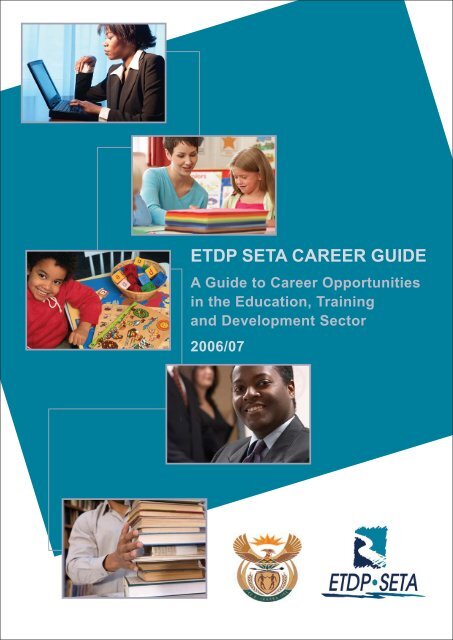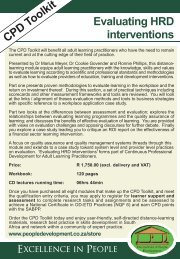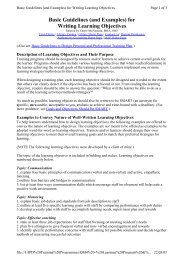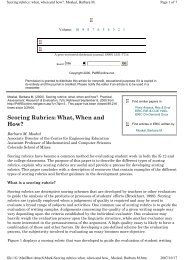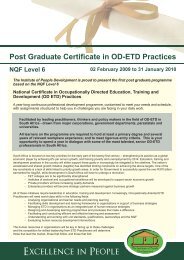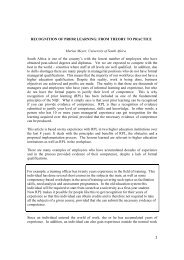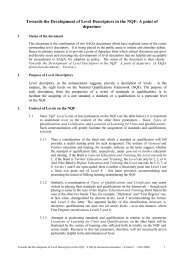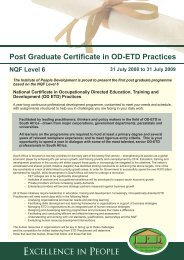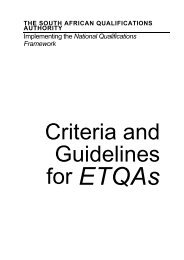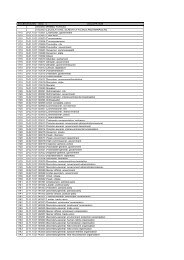ETDP SETA CAREER GUIDE - The Institute of People Development
ETDP SETA CAREER GUIDE - The Institute of People Development
ETDP SETA CAREER GUIDE - The Institute of People Development
You also want an ePaper? Increase the reach of your titles
YUMPU automatically turns print PDFs into web optimized ePapers that Google loves.
<strong>ETDP</strong> <strong>SETA</strong> <strong>CAREER</strong> <strong>GUIDE</strong><br />
A Guide to Career Opportunities<br />
in the Education, Training<br />
and <strong>Development</strong> Sector<br />
2006/07
© Copyright<br />
This work is copyright. No part may be reproduced without prior written permission. However, permission is given to ETD practitioners to make copies by<br />
printing or duplicating files for use within their own organisations for purposes <strong>of</strong> advising learners. Inquiries concerning other reproduction and rights should<br />
be directed to the <strong>ETDP</strong> <strong>SETA</strong> (see address below). <strong>The</strong> content has been produced with the assistance <strong>of</strong> the <strong>Institute</strong> <strong>of</strong> <strong>People</strong> <strong>Development</strong>. However<br />
the views expressed in this version <strong>of</strong> the work do not necessarily represent the views <strong>of</strong> the materials developers.<br />
<strong>The</strong> <strong>ETDP</strong> <strong>SETA</strong> and material developers have compiled the content in good faith and tried to ensure that all content is accurate and does not breach any<br />
entity’s rights at the time <strong>of</strong> its inclusion. However, the content may contain unintentional errors and is provided 'as is'.<br />
Published by <strong>ETDP</strong> <strong>SETA</strong><br />
3 Annet Road<br />
Curatio Building<br />
Auckland Park<br />
Johannesburg<br />
2107<br />
Private Bag X105<br />
Melville<br />
2109<br />
Telephone: (011) 628 5000<br />
Facsimile: (011) 482 6419<br />
E-mail: enquiries@etdpseta.org.za<br />
Web site: www.etdpseta.org.za<br />
TOLL FREE NUMBER: 0800 <strong>ETDP</strong> 73<br />
A Guide to Career Opportunities in the Education, Training and <strong>Development</strong> Sector
Contents<br />
1. Introduction 1<br />
1.1. What is the purpose <strong>of</strong> this guide? 1<br />
1.2. Who is it for? 1<br />
1.3. What is in the guide? 1<br />
2. Definitions and Acronyms 2<br />
2.1. Definitions 2<br />
2.2. Acronyms 3<br />
3. ETD Sector 4<br />
3.1. What is the ETD sector? 4<br />
3.2. Where are ETD practitioners employed? 4<br />
3.3. What knowledge and skills are required to be an ETD practitioner? 5<br />
3.4. What do ETD practitioners do? 6<br />
3.5. What are typical career paths in the ETD sector? 6<br />
4. Learning Opportunities in the ETD Sector 8<br />
4.1. What are the ETD Qualifications on the NQF? 8<br />
4.2. Who are the Training Providers? 9<br />
4.3. What is a learnership? 9<br />
4.4. Why were learnerships introduced? 9<br />
4.5. Who is involved in learnerships? 9<br />
4.6. What are the benefits <strong>of</strong> learnerships? 10<br />
4.7. How to get involved in learnerships? 10<br />
5. Scarce Skills in the ETD Sector 11<br />
5.1. What are scarce skills? 11<br />
5.2. What skills are scarce in the ETD sector nationally? 11<br />
5.3. What skills are scarce in the ETD sector by province? 12<br />
5.4. What skills are scarce in the ETD sector by ETD constituency? 16<br />
6. Critical Skills in the ETD Sector 24<br />
6.1. What are critical skills? 24<br />
6.2. What skills are critical in the ETD sector nationally? 25<br />
6.3. What skills are critical in the ETD sector by province? 25<br />
6.4. What skills are critical in the ETD sector by constituency? 28<br />
7. List <strong>of</strong> <strong>ETDP</strong> <strong>SETA</strong> Learnerships to Address Scarce and Critical Skills in<br />
the ETD Sector 33<br />
8. Conclusion 34<br />
8.1 How can you use this guide if you are a learner? 34<br />
8.2 How can you use this guide if you are a provider? 34<br />
8.3 How can you use this guide if you are a skills development facilitator working<br />
at a public, private or development sector organisation? 34<br />
A Guide to Career Opportunities in the Education, Training and <strong>Development</strong> Sector
1. Introduction<br />
1.1. What is the purpose <strong>of</strong> this guide?<br />
This guide aims to:<br />
- Promote a greater awareness <strong>of</strong> career opportunities in the ETD sector amongst<br />
prospective learners,<br />
- Provide a resource that Skills <strong>Development</strong> Facilitators (SDF’s), Career Guide<br />
Councillors, or Education Specialists can use to disseminate information on scarce<br />
and critical skills in the ETD sector, and<br />
- Provide a list <strong>of</strong> scarce and critical skills nationally, provincially and by constituency<br />
in the ETD.<br />
1.2. Who is it for?<br />
This guide has been specifically written for those who wish to know more about the<br />
career opportunities in the ETD sector for either individual or information sharing<br />
benefits, i.e.<br />
- Career counsellors<br />
- Unemployed people<br />
- Learners<br />
- Employees<br />
- Employers<br />
- Shop stewards<br />
- Government (provincial/national/local)<br />
- Service providers<br />
- Skills development facilitators<br />
- Sector specialists<br />
1.3. What is in the guide?<br />
This guide is designed to help people understand the learning and career path<br />
opportunities in the ETD sector. <strong>The</strong> guide therefore includes:<br />
- An overview <strong>of</strong> the ETD sector<br />
- Learning opportunities in the ETD sector<br />
- Scarce skills in the ETD sector<br />
- Critical skills in the ETD sector<br />
- Available qualifications and learnerships in the ETD sector<br />
A Guide to Career Opportunities in the Education, Training and <strong>Development</strong> Sector 1
2. Definitions and Acronyms<br />
2.1. Definitions<br />
Accreditation<br />
<strong>The</strong> process by which an authority gives formal recognition to an organisation. This<br />
recognition acknowledges that the organisation is competent to provide the learning<br />
for which it is accredited, in accordance with the regulations, criteria and guidelines<br />
<strong>of</strong> SAQA and the ETQA.<br />
Assessment<br />
<strong>The</strong> process <strong>of</strong> evaluating evidence to measure whether a learner has the competence<br />
described in NQF unit standards and qualifications, as a basis for awarding the unit<br />
standard or qualification.<br />
Critical skills<br />
Skills gaps within an organisation. This refers to the kinds <strong>of</strong> skills which an organisation<br />
needs, but which even some <strong>of</strong> the qualified people do not have.<br />
Scarce skills<br />
Skills shortages, in other words a shortage <strong>of</strong> people who hold the qualifications or<br />
experience required in particular occupations.<br />
Learner<br />
Someone who is studying toward earning a qualification or unit standard. In the case<br />
<strong>of</strong> learnerships, the learner is also party to a learnership agreement with one or more<br />
employers and one or more providers.<br />
Learnership<br />
A program <strong>of</strong> learning that consists <strong>of</strong> a structured learning component as well as<br />
practical on the job learning. Learnerships result in a full qualification, in other words<br />
they are not <strong>of</strong>fered against individual unit standards.<br />
Qualification<br />
A qualification is a planned combination <strong>of</strong> learning outcomes that have a defined<br />
purpose or purposes, for example a Higher Diploma in Education.<br />
Provider<br />
Any organisation which provides education or training, such as schools, universities,<br />
colleges, universities <strong>of</strong> technology, universities, workplace training centres, private<br />
learning providers, and workplaces.<br />
Employer<br />
An organisation or individual that employs a learner during or after learning. In the<br />
case <strong>of</strong> learnerships, an employer has specific responsibilities for ensuring that<br />
learning that is happening on the job is integrated with the structured learning.<br />
A Guide to Career Opportunities in the Education, Training and <strong>Development</strong> Sector 2
2.2. Acronyms<br />
ABET - Adult Basic Education and Training<br />
<strong>ETDP</strong> - Education, Training and <strong>Development</strong> Practices<br />
ETQA - Education and Training Quality Assurer<br />
FET - Further Education and Training<br />
GET - General Education and Training<br />
HET - Higher Education and Training<br />
NQF - National Qualifications Framework<br />
NSA - National Skills Authority<br />
SAQA - South African Qualifications Authority<br />
SDF - Skills <strong>Development</strong> Facilitator<br />
<strong>SETA</strong> - Sector Education and Training Authority<br />
SSP - Sector Skills Plan<br />
A Guide to Career Opportunities in the Education, Training and <strong>Development</strong> Sector 3
3.1. What is the ETD sector?<br />
3. What is the Education,<br />
Training and <strong>Development</strong><br />
(ETD) sector all about?<br />
It is a sector that deals with education, training and development practices in formal<br />
and informal public and private institutions, organisations, committees, pr<strong>of</strong>essional<br />
bodies, etc. and across all ages <strong>of</strong> human development.<br />
<strong>The</strong> Education, Training and <strong>Development</strong> Practices Sector Education and Training<br />
Authority (<strong>ETDP</strong> <strong>SETA</strong>) was established in March 2000 and re-established in 2004<br />
to promote and facilitate the delivery <strong>of</strong> education, training and development sector<br />
initiatives in order to enhance the skills pr<strong>of</strong>ile <strong>of</strong> the ETD sector. It advocates high<br />
quality life-long learning, is committed to the alleviation <strong>of</strong> unemployment and assists<br />
the ETD sector in contributing positively to the economy <strong>of</strong> South Africa. This is in<br />
line with Accelerated Shared Growth Initiative for South Africa (ASGISA) and Joint<br />
Initiative for Priority Skills Acquisition (JIPSA).<br />
<strong>The</strong> <strong>ETDP</strong> <strong>SETA</strong> has two Chambers, viz. a Budget Chamber and a Levy Chamber.<br />
<strong>The</strong> former includes government departments (defined by the legislative framework)<br />
where provision for skills development is through the allocation <strong>of</strong> 1% <strong>of</strong> payroll. <strong>The</strong><br />
government departments support their line <strong>SETA</strong> through the allocation <strong>of</strong> 10% (<strong>of</strong><br />
the 1%) <strong>of</strong> the skills development budget allocated to the administration <strong>of</strong> the <strong>SETA</strong>,<br />
and therefore do not actually participate in the levy/grant system. In the case <strong>of</strong> the<br />
<strong>ETDP</strong> <strong>SETA</strong>, the Department <strong>of</strong> Education (DoE), through its national <strong>of</strong>fice and nine<br />
provincial departments as well as all public early childhood development centres,<br />
public schools (primary, secondary and combined schools), public FET colleges and<br />
public ABET centres are members <strong>of</strong> the Budget Chamber.<br />
All members <strong>of</strong> the Levy Chamber are part <strong>of</strong> the levy/ grant system, i.e. they pay<br />
the skills development levy. This chamber is made up <strong>of</strong> the following 11 constituencies,<br />
making it a diverse and intricate sector to understand and service: ECD, public FET<br />
– council as employers, public HEIs, public schools governing body (SGB) employees,<br />
independent schools, libraries and archives, research organisations, political parties<br />
as employers, trade unions as employers, and NGOs & CBOs.<br />
3.2. Where are ETD Practitioners employed?<br />
<strong>The</strong>re are approximately 56 754 employers in the ETD sector. Together, these employ<br />
an estimated 656 068 people, which amounts to 6% <strong>of</strong> South Africa’s employed<br />
people.<br />
<strong>The</strong> various categories <strong>of</strong> employers are shown in Diagram One (overleaf). <strong>The</strong><br />
biggest employer in the sector is the Department <strong>of</strong> Education, and the biggest<br />
category <strong>of</strong> employees is teachers.<br />
It is useful to divide the various employers into three main sub-categories, as shown<br />
in Diagram One (overleaf).<br />
This categorisation is useful for several reasons:<br />
- ETD practitioners find it easier to move from one employer in any category to<br />
another employer in the same category. For example, school teachers find it easier<br />
to move from one school to another than from a school to a workplace (and vice<br />
versa).<br />
- <strong>The</strong> types <strong>of</strong> knowledge and skill required to be a competent ETD practitioner in<br />
different environments differ. (See point 3.3 overleaf).<br />
A Guide to Career Opportunities in the Education, Training and <strong>Development</strong> Sector 4
Diagram One: Types <strong>of</strong> employers in the ETD Sector<br />
Diagram One:<br />
Where ETD Practitioners are Employed<br />
Specialised ETD Institutions, eg.<br />
Schools, universities, FET colleges,<br />
industry training colleges,<br />
regional training centres,<br />
private training providers, etc.<br />
Public and Private Sector<br />
Workplaces, eg.<br />
Commercial and industrial workplaces,<br />
central provincial and<br />
local government workplaces,<br />
hospitals, etc.<br />
Civil Society Organisations eg.<br />
Churches, cultural organisations,<br />
political organisations, trade unions,<br />
community-based organisations, NGOs, etc.<br />
<strong>The</strong> different categories <strong>of</strong> employers share common features in relation to ETD<br />
practice – in other words, how practitioners teach, assess, manage, etc. Specialised<br />
ETD institutions have education and training as their core business, and the curriculum<br />
tends to be organised around the knowledge and skill to be learned. Workplaces<br />
and civil society have education and training as a support activity, and the curriculum<br />
tends to be organised around supporting production or service delivery or the projects<br />
in which they are embedded.<br />
3.3. What types <strong>of</strong> knowledge and skills are required to be an ETD Practitioner?<br />
<strong>The</strong> types <strong>of</strong> knowledge and skills required to be an ETD practitioner in different<br />
environments differ considerably. <strong>The</strong> ETD Practices Project suggested the following<br />
classification:<br />
- Subject-matter expertise (or what is being taught). This includes subject matter<br />
such as mathematics or science in schools and universities; in industry workplaces<br />
it includes welding or cash-registers. In essence, nobody can effectively teach<br />
something that they themselves do not understand. Programs that train school<br />
educators normally include subject-matter training, while workplace practitioners<br />
normally develop their subject-matter expertise before starting to learn about ETD.<br />
- Contextual understanding (or an understanding <strong>of</strong> where and who is being taught<br />
as well as why). For example, teaching adults is different to teaching young children.<br />
Similarly, the purpose <strong>of</strong> general education is formative development <strong>of</strong> the whole<br />
person, while workplace training aims to teach specific job-skills. Programs which<br />
help people to become an ETD practitioner therefore include a focus on the specifics<br />
<strong>of</strong> who, where and why in the schooling sector.<br />
- ETD expertise (or how to teach). This may include how to teach, how to design<br />
learning programs and materials, how to administer or manage them, how to<br />
evaluate them, etc. In the case <strong>of</strong> schooling, programs normally cover all the above<br />
during a single course <strong>of</strong> study. In the case <strong>of</strong> workplace training, programs more<br />
<strong>of</strong>ten deal with each <strong>of</strong> these separately.<br />
A Guide to Career Opportunities in the Education, Training and <strong>Development</strong> Sector 5
3.4. What do ETD Practitioners do?<br />
What ETD practitioners do may be described in terms <strong>of</strong> a set <strong>of</strong> roles:<br />
- identifying learning needs<br />
- designing learning programs<br />
- developing learning materials<br />
- teaching or training (i.e. helping groups to learn)<br />
- coaching and mentoring (i.e. helping individuals to learn)<br />
- assessing learning<br />
- managing learning organisations or programs<br />
- evaluating learning programs<br />
- providing administrative support to learning programs and organisations<br />
<strong>The</strong>se roles are shown in Diagram Two:<br />
Diagram Two: What ETD Practitioners do.<br />
Diagram Two:<br />
What ETD Practitioners DO<br />
Manage<br />
Market<br />
Identify<br />
Needs<br />
Administer<br />
Assess /<br />
Evaluate<br />
Design Programs /<br />
Develop Materials<br />
Guide and<br />
Counsel<br />
etc.<br />
Teach / Train /<br />
Coach / Mentor<br />
Some support roles<br />
<strong>The</strong> main ETD roles in helping people to learn<br />
3.5. What are typical career paths in the ETD sector?<br />
<strong>The</strong> typical career progression in the ETD pr<strong>of</strong>essions is normally as outlined in<br />
Diagram Three (overleaf). Note that this diagram is typical <strong>of</strong> most sub-sectors in<br />
the ETD field, but is not typical <strong>of</strong> others (for example research organisations or<br />
libraries).<br />
A Guide to Career Opportunities in the Education, Training and <strong>Development</strong> Sector 6
Diagram Three: Typical career paths in the ETD sector.<br />
Diagram Three:<br />
Typical Career Paths in the ETD Sector<br />
Manager (eg. school principal, CEO <strong>of</strong> training company, or<br />
HR manager in a workplace)<br />
Program<br />
Designer<br />
Specialist<br />
Assessor<br />
Teaching other<br />
subjects or areas<br />
Subject-matter<br />
specialist<br />
Teacher or Trainer<br />
General all-Inclusive<br />
program <strong>of</strong> study<br />
(eg. school teachers)<br />
Workplace experience<br />
or training, followed by<br />
short ETD courses<br />
(eg. workplace trainers)<br />
Voluntary involvement,<br />
followed by short<br />
courses leading to<br />
employment (civil society)<br />
A Guide to Career Opportunities in the Education, Training and <strong>Development</strong> Sector 7
4. Learning opportunities<br />
in the ETD sector<br />
4.1. What are the ETD Qualifications on the National Qualifications Framework?<br />
<strong>The</strong> learning opportunities for the ETD sector lie mainly in the HET sector, as shown<br />
in Table 4.1 below. Individuals who meet the requirements <strong>of</strong> the different providers<br />
may undertake one <strong>of</strong> the many qualifications available. However, the scarce skills<br />
detailed in section 5 are particularly recommended since there are more employment<br />
opportunities for such skills. (This does not mean that there are no employment<br />
opportunities for other skills, only that the greatest demand is for the scarce skills).<br />
Also, many providers <strong>of</strong>fer programs that address the critical skills, and it is particularly<br />
recommended to skills development facilitators that they include a focus on critical<br />
skills for existing employees.<br />
Table 4.1: Registered NQF Qualifications in the ETD Sector.<br />
NQF<br />
Level<br />
8 Higher<br />
Education<br />
and<br />
Training<br />
(HET)<br />
NQF<br />
Band Qualification Type Providers<br />
7 - Masters<br />
- Degrees<br />
6<br />
- Post-Doctoral research degrees<br />
- Doctorates<br />
5 - Pr<strong>of</strong>essional Diploma in<br />
Education Level 5<br />
- National Diploma in OD ETD<br />
Practice Level 5<br />
- National Certificate in OD ETD<br />
Practice Level 5<br />
- National Diploma in Environmental<br />
Education Practice Level 5<br />
- National Certificate in Environmental ETD<br />
Practice Level 5<br />
- National Diploma in Early Childhood<br />
<strong>Development</strong> Level 5<br />
- Higher Certificate in Early Childhood<br />
<strong>Development</strong> Level 5<br />
- Higher Education and Training<br />
Certificate: <strong>Development</strong><br />
Practice Level 5<br />
4 Further<br />
Education<br />
and<br />
Training<br />
(FET)<br />
- National Certificate in OD ETD<br />
Practice Level 6<br />
- National Certificate in OD ETD<br />
Practice Level 4<br />
- National Certificate in Environmental<br />
ETD Practice Level 4<br />
- National Certificate in Early<br />
Childhood <strong>Development</strong> Level 4<br />
- Further Education and Training<br />
Certificate: <strong>Development</strong> Practice: Level 4<br />
- Universities<br />
- Universities<br />
<strong>of</strong> Technology<br />
- Universities<br />
- Universities<br />
<strong>of</strong> Technology<br />
- Universities<br />
- Private Training<br />
Providers<br />
- Universities<br />
- Universities<br />
<strong>of</strong> Technology<br />
- Private Training<br />
Providers<br />
- FET Colleges<br />
- Private Training<br />
Providers<br />
- Workplace<br />
Training<br />
Providers<br />
- Nongovernmental<br />
organisations<br />
A Guide to Career Opportunities in the Education, Training and <strong>Development</strong> Sector 8
3<br />
2<br />
1 General<br />
Education<br />
and<br />
Training<br />
(GET)<br />
- Basic Certificate in Early Childhood<br />
<strong>Development</strong>: Level 1<br />
- General Education and Training<br />
Certificate: <strong>Development</strong> Practice:<br />
Level 1<br />
- Schools<br />
- Private<br />
Training<br />
Providers<br />
- Nongovernmental<br />
organisations<br />
4.2. Who are the training providers in the ETD Sector?<br />
New providers are regularly accredited to <strong>of</strong>fer various ETD qualifications. Also,<br />
existing providers sometimes extend their accreditation to include new programs.<br />
For this reason, it is recommended that you consult the <strong>ETDP</strong> <strong>SETA</strong> website for a<br />
full list <strong>of</strong> which providers are accredited, and what they are accredited to <strong>of</strong>fer.<br />
4.3. What is a learnership?<br />
A learnership is a work-based route to a qualification. <strong>The</strong> learning therefore includes<br />
structured practical work experience as well as structured theory learning. Learnerships<br />
are based on the apprenticeship model, but differ from apprenticeships since they<br />
are based on the work experience, not on how long the learner spends working.<br />
<strong>The</strong>re are clear outcomes as to what the learner must achieve. Learnerships are not<br />
only <strong>of</strong>fered in technical areas, but can be <strong>of</strong>fered against many different types <strong>of</strong><br />
qualifications including ETD qualifications.<br />
4.4. Why were learnerships introduced?<br />
Learnerships were introduced because much <strong>of</strong> the education and training provided<br />
to prepare people for the workplace did not link the theory to practical experience,<br />
or in some cases provided no practical experience. Learnerships put practical<br />
experience at the core <strong>of</strong> the learning, and provide clear links between the theory<br />
and the practice.<br />
For someone who is not employed and introduced to a potential employer who can<br />
<strong>of</strong>fer them work experience, learnerships provide a way for these unemployed people<br />
to enter the job market. Also, for people who are already employed, learnerships <strong>of</strong>fer<br />
a way <strong>of</strong> embarking on a structured learning program without having to give up their<br />
job.<br />
4.5. Who is involved in learnerships?<br />
A learnership involves three main parties:<br />
- the learner,<br />
- the training provider,<br />
- the employer.<br />
<strong>The</strong>se three parties sign an agreement before starting which outlines the rights and<br />
responsibilities <strong>of</strong> each party. <strong>The</strong> agreement is lodged with the <strong>SETA</strong>, which assures<br />
the quality <strong>of</strong> the learnership program. Should there be any disputes as to whether<br />
one <strong>of</strong> the parties is fulfilling their responsibilities, appeal can be made to the <strong>SETA</strong>.<br />
A Guide to Career Opportunities in the Education, Training and <strong>Development</strong> Sector 9
4.6. What are the benefits <strong>of</strong> learnerships?<br />
For the learners, a learnership<br />
- provides a qualification that can be obtained in the workplace while earning a small<br />
allowance to pay for expenses<br />
- recognises existing skills and knowledge <strong>of</strong> existing employees if they have been<br />
working in the job without being qualified<br />
- provides learners with learning that is both practical and theoretical<br />
For the employers, a learnership<br />
- introduces them to potential employees who they themselves can train into the job<br />
- helps them to improve the competence <strong>of</strong> their existing employees<br />
4.7. How to get involved in a learnership?<br />
Each learnership has different entry requirements. Consult the <strong>ETDP</strong> <strong>SETA</strong> website<br />
list <strong>of</strong> learnerships to find out the entry requirements for learnerships you are interested<br />
in. Also, make sure to check with the provider and employer who are <strong>of</strong>fering the<br />
learnership what their entry requirements are.<br />
Employers sign up learners for learnerships from within their organisations – in other<br />
words, from people who are already employed. Or they may look for learnerships<br />
from outside the organisation – keep watch for employers advertising learnerships.<br />
You may also apply to the <strong>ETDP</strong> <strong>SETA</strong> to be placed on a learnership. Consult the<br />
<strong>ETDP</strong> <strong>SETA</strong> website for application forms for various learnerships, or refer to<br />
Table 7.1 in Section 7 <strong>of</strong> this guide.<br />
A Guide to Career Opportunities in the Education, Training and <strong>Development</strong> Sector 10
5. Scarce skills in the ETD sector<br />
5.1. What are “scarce skills”?<br />
In this context, scarce skill means an occupation in which there are few or no qualified<br />
and experienced people currently or in the future to fill the occupation. Shortage <strong>of</strong><br />
such people might be due to relative scarcity (i.e. suitable skilled people are available<br />
but do not meet other employment criteria such as geographic location, equity<br />
considerations and replacement demand), or absolute scarcity (i.e. there are few, if<br />
any, people in the country with the requisite skills; education and training providers<br />
have yet to develop learning programmes to meet the skills requirements; and there<br />
are no people enrolled or engaged in the process <strong>of</strong> acquiring the skills that need to<br />
be replaced) (DoL, 2005)<br />
5.2. What skills are scarce in the ETD sector nationally?<br />
Table 5.1 shows the national scarce skills list for <strong>ETDP</strong> and how many personnel in<br />
the top scarce skills occupations are anticipated over the next 5 years (i) at a<br />
company/organisation level and (ii) at a constituency level.<br />
Table 5.1 Scarce Skills in the ETD Sector Nationally by Priority by Occupation.<br />
No. Occupation<br />
1<br />
2<br />
3<br />
4<br />
5<br />
6<br />
7<br />
8<br />
9<br />
10<br />
11<br />
12<br />
13<br />
14<br />
15<br />
16<br />
17<br />
18<br />
19<br />
20<br />
Additional personnel<br />
anticipated over the<br />
next 5 years in<br />
company or<br />
organisation.<br />
Additional personnel<br />
anticipated over the<br />
next 5 years in<br />
the country.<br />
Finance Managers 13 621<br />
School Teachers – Maths 46 2192<br />
Early Childhood (Pre-primary School) Teachers 5 1261<br />
School Teachers – Natural Sciences 48 2307<br />
School Teachers – Technology (includes ICT) 46 2202<br />
General Managers 5 1170<br />
Human Resource Managers 34 649<br />
Assessor 14 445<br />
Research and <strong>Development</strong> Managers 45 678<br />
Moderator 9 298<br />
Information and Communication Technology 8 238<br />
(ICT) Managers<br />
Accountant (General) 5 1058<br />
School Teachers – Languages 5 1819<br />
Primary School Teachers 68 4202<br />
Chief Executives and Managing Directors 122 242<br />
Facilitator 11 60<br />
Policy and Planning Managers 5 142<br />
Office Administrators 9 595<br />
Special Needs Teacher 223 1930<br />
School Teachers – Economic and 80 2674<br />
Management Sciences<br />
A Guide to Career Opportunities in the Education, Training and <strong>Development</strong> Sector 11
5.3. What skills are scarce in the ETD sector by province?<br />
Tables 5.2 - 5.10 show the provincial scarce skills results: how many personnel in<br />
the scarce skills occupations are anticipated over the next 5 years (i) at a company<br />
level, and (ii) at a constituency level. Where a cell is left blank, this indicates that no<br />
data was available.<br />
Table 5.2 Scarce Skills in the Eastern Cape by Priority by Occupation.<br />
No. Occupation<br />
1<br />
2<br />
3<br />
4<br />
5<br />
6<br />
7<br />
8<br />
9<br />
10<br />
11<br />
12<br />
13<br />
Additional personnel<br />
anticipated over the<br />
next 5 years in<br />
company or<br />
organisation.<br />
Additional personnel<br />
anticipated over the<br />
next 5 years in<br />
the country.<br />
Finance Managers 3 138<br />
Early Childhood (Pre-primary School) Teachers 3 644<br />
School Teachers – Maths 4 464<br />
Research and <strong>Development</strong> Managers 10 21<br />
School Teachers – Natural Sciences 4 383<br />
ICT Network and Support Pr<strong>of</strong>essionals 14 375<br />
Quality Assurance Manager 2 8<br />
School Teachers – Technology (includes ICT) 3 550<br />
General Managers 2 166<br />
Information and Communication Technology 10 7<br />
(ICT) Managers<br />
Accountant (General) 4 30<br />
CEO and Managing Directors 3 22<br />
Policy and Planning Managers 2 129<br />
Table 5.3 Scarce Skills in the Free State by Priority by Occupation.<br />
No. Occupation<br />
1<br />
2<br />
3<br />
4<br />
5<br />
6<br />
7<br />
8<br />
9<br />
10<br />
Additional personnel<br />
anticipated over the<br />
next 5 years in<br />
company or<br />
organisation.<br />
Additional personnel<br />
anticipated over the<br />
next 5 years in<br />
the country.<br />
Finance Managers 3 1353<br />
School Teachers – Maths 4 63<br />
School Teachers – Natural Sciences 7 400<br />
Research and <strong>Development</strong> Managers 4 1685<br />
School Teachers – Technology (includes ICT) 2 667<br />
Chief Executives and Managing Directors 5 25<br />
General Managers 2 369<br />
Legal Pr<strong>of</strong>essionals 2 769<br />
Moderator 2 143<br />
Office Administrators 4 265<br />
A Guide to Career Opportunities in the Education, Training and <strong>Development</strong> Sector 12
Table 5.4 Scarce Skills in the Gauteng by Priority by Occupation.<br />
No. Occupation<br />
1<br />
2<br />
3<br />
4<br />
5<br />
6<br />
7<br />
8<br />
9<br />
10<br />
Additional personnel<br />
anticipated over the<br />
next 5 years in<br />
company or<br />
organisation.<br />
Additional personnel<br />
anticipated over the<br />
next 5 years in<br />
the country.<br />
Finance Managers 3 849<br />
Early Childhood (Pre-primary School) Teachers 6 497<br />
School Teachers – Maths 12 2756<br />
School Teachers – Technology (includes ICT) 10 2372<br />
School Teachers – Natural Sciences 10 1235<br />
General Managers 7 4009<br />
Accountant (General) 7 2739<br />
Chief Executives and Managing Directors 6 142<br />
Information and Communication Technology 7 380<br />
(ICT) Managers<br />
School Teachers – Languages 10 872<br />
Table 5.5 Scarce Skills in the KwaZulu-Natal by Priority by Occupation.<br />
No. Occupation<br />
1<br />
2<br />
3<br />
4<br />
5<br />
6<br />
7<br />
8<br />
9<br />
10<br />
Additional personnel<br />
anticipated over the<br />
next 5 years in<br />
company or<br />
organisation.<br />
Table 5.6 Scarce Skills in the Limpopo by Priority by Occupation.<br />
Additional personnel<br />
anticipated over the<br />
next 5 years in<br />
the country.<br />
School Teachers – Maths 162 2617<br />
Finance Managers 4 880<br />
School Teachers – Natural Sciences 212 4147<br />
Early Childhood (Pre-primary School) Teachers 4 3022<br />
Assessor 11 1108<br />
General Managers 3 514<br />
Accountant (General) 3 158<br />
Facilitator 11 1100<br />
Research and <strong>Development</strong> Managers 5 1291<br />
Special Needs Teacher 913 5763<br />
No. Occupation<br />
1<br />
2<br />
3<br />
4<br />
5<br />
6<br />
7<br />
8<br />
9<br />
10<br />
11<br />
Additional personnel<br />
anticipated over the<br />
next 5 years in<br />
company or<br />
organisation.<br />
Additional personnel<br />
anticipated over the<br />
next 5 years in<br />
the country.<br />
Finance Managers 5 535<br />
Early Childhood (Pre-primary School) Teachers 4 3617<br />
School Teachers – Maths 4 2811<br />
School Teachers – Natural Sciences 4 2033<br />
General Managers 2 385<br />
Facilitator 9 69<br />
Human Resource Managers 9 373<br />
Chief Executives and Managing Directors 13 33<br />
Curriculum Design 2 126<br />
Moderator 7 151<br />
Quality Assurance Manager 2 47<br />
A Guide to Career Opportunities in the Education, Training and <strong>Development</strong> Sector 13
Table 5.7 Scarce Skills in the Mpumalanga by Priority by Occupation.<br />
No. Occupation<br />
1<br />
2<br />
3<br />
4<br />
5<br />
6<br />
7<br />
8<br />
9<br />
10<br />
11<br />
12<br />
Additional personnel<br />
anticipated over the<br />
next 5 years in<br />
company or<br />
organisation.<br />
Table 5.8 Scarce Skills in the Northern Cape by Priority by Occupation.<br />
Additional personnel<br />
anticipated over the<br />
next 5 years in<br />
the country.<br />
Finance Managers 2 313<br />
Early Childhood (Pre-primary School) Teachers 7 1000<br />
Accountant (General) 3 145<br />
Human Resource Managers 3 233<br />
Assessor 3 8<br />
General Managers 2 79<br />
Moderator 3 10<br />
Child Carers 1 -<br />
Facilitator 7 54<br />
School Teachers – Maths 8 700<br />
School Teachers – Natural Sciences 8 700<br />
Secretary (General) 7 950<br />
No. Occupation<br />
1<br />
2<br />
3<br />
4<br />
5<br />
6<br />
7<br />
8<br />
9<br />
10<br />
Additional personnel<br />
anticipated over the<br />
next 5 years in<br />
company or<br />
organisation.<br />
Additional personnel<br />
anticipated over the<br />
next 5 years in<br />
the country.<br />
Finance Managers 2 341<br />
Human Resource Managers 3 260<br />
Research and <strong>Development</strong> Managers 8 9<br />
School Teachers – Maths 2 1240<br />
School Teachers – Economic and Management 3 500<br />
Sciences<br />
School Teachers – Natural Sciences 3 1525<br />
School Teachers – Technology (includes ICT) 2 250<br />
Early Childhood (Pre-primary School) Teachers 3 20<br />
Information and Communication Technology 1 7<br />
(ICT) Managers<br />
Office Administrators 4 207<br />
A Guide to Career Opportunities in the Education, Training and <strong>Development</strong> Sector 14
Table 5.9 Scarce Skills in the North West by Priority by Occupation.<br />
No. Occupation<br />
1<br />
2<br />
3<br />
4<br />
5<br />
6<br />
7<br />
8<br />
9<br />
10<br />
11<br />
12<br />
13<br />
14<br />
15<br />
Table 5.10 Scarce Skills in the Western Cape by Priority by Occupation.<br />
No. Occupation<br />
1<br />
2<br />
3<br />
4<br />
5<br />
6<br />
7<br />
8<br />
9<br />
10<br />
Additional personnel<br />
anticipated over the<br />
next 5 years in<br />
company or<br />
organisation.<br />
Finance Managers 3 1692<br />
Early Childhood (Pre-primary School) Teachers 5 410<br />
Quality Assurance Manager 4 363<br />
Research and <strong>Development</strong> Managers 6 1787<br />
Chief Executives and Managing Directors 4 100<br />
Human Resource Managers 3 179<br />
School Teachers – Maths 20 1467<br />
School Teachers – Natural Sciences 19 2000<br />
Skills <strong>Development</strong> Practitioner 3 195<br />
Assessor 16 105<br />
Curriculum Design 31 149<br />
Information and Communication Technology 8 847<br />
(ICT) Managers<br />
Moderator 17 142<br />
Primary School Teachers 2 65<br />
University Lecturer 28 500<br />
Additional personnel<br />
anticipated over the<br />
next 5 years in<br />
company or<br />
organisation.<br />
Additional personnel<br />
anticipated over the<br />
next 5 years in<br />
the country.<br />
Additional personnel<br />
anticipated over the<br />
next 5 years in<br />
the country.<br />
School Teachers – Maths 3 2544<br />
Early Childhood (Pre-primary School) Teachers 5 393<br />
School Teachers – Natural Sciences 4 2544<br />
Finance Managers 97 1569<br />
School Teachers – Technology (includes ICT) 19 1188<br />
Primary School Teachers 5 514<br />
School Teachers – Economic and 5 25<br />
Management Sciences<br />
General Managers 15 44<br />
School Teachers – Languages 2 1500<br />
School Principals 1 525<br />
A Guide to Career Opportunities in the Education, Training and <strong>Development</strong> Sector 15
5.4. What skills are scarce in the ETD sector by constituency?<br />
Tables 5.11 - 5.22 show the constituency scarce skills results: how many personnel in<br />
the scarce skills occupations are anticipated over the next 5 years (i) at a company level<br />
and (ii) at a constituency level. Where no figure is given, there is insufficient data available.<br />
Table 5.11 Scarce skill in the Department <strong>of</strong> Education by Priority by Occupation<br />
(DoE).<br />
No. Occupation<br />
1<br />
2<br />
3<br />
4<br />
5<br />
6<br />
7<br />
8<br />
9<br />
10<br />
11<br />
12<br />
13<br />
14<br />
15<br />
16<br />
17<br />
18<br />
19<br />
Additional personnel<br />
anticipated over the<br />
next 5 years in<br />
company or<br />
organisation.<br />
Additional personnel<br />
anticipated over the<br />
next 5 years in<br />
the country.<br />
Research and <strong>Development</strong> Managers 22 84<br />
School Teachers – Maths 1251 5879<br />
Finance Managers 8 57<br />
Information and Communication Technology 23 240<br />
(ICT) Managers<br />
School Teachers – Natural Sciences 1038 6275<br />
School Teachers – Technology (includes ICT) 795 3310<br />
Policy and Planning Managers 11 57<br />
School Teachers – Languages 35 2760<br />
School Teachers – Economic & 1000 6519<br />
Management Sciences<br />
Accountant (General) 3 736<br />
Educational Psychologists - 1406<br />
Early Childhood (Pre-primary School) Teachers 2 5667<br />
ICT Network and Support Pr<strong>of</strong>essionals 26 57<br />
Psychologists 17 1601<br />
Quality Assurance Manager 7 17<br />
Data and System Administrators, and ICT 26 66<br />
Security Specialists<br />
Human Resource Managers 14 9<br />
Special Needs Teacher 1473 6243<br />
Technical Teacher/Lecturer (FET) 60 46<br />
A Guide to Career Opportunities in the Education, Training and <strong>Development</strong> Sector 16
Table 5.12 Scarce skill in Early Childhood <strong>Development</strong> by Priority by Occupation<br />
(ECD).<br />
No. Occupation<br />
1<br />
2<br />
3<br />
4<br />
5<br />
6<br />
7<br />
8<br />
9<br />
10<br />
11<br />
12<br />
13<br />
14<br />
15<br />
16<br />
17<br />
18<br />
19<br />
Additional personnel<br />
anticipated over the<br />
next 5 years in<br />
company or<br />
organisation.<br />
Additional personnel<br />
anticipated over the<br />
next 5 years in<br />
the country.<br />
Early Childhood (Pre-primary School) Teachers 5 489<br />
Child Carers 6 533<br />
Child Care Centre Managers 2 169<br />
Personal Carers and Assistants 4 –<br />
ECD Trainers 5 379<br />
ECD Practitioner 9 433<br />
Moderator 3 159<br />
Assessor 3 137<br />
Curriculum Design 3 133<br />
Educational Aides 4 100<br />
Quality Assurance Manager 2 136<br />
Skills <strong>Development</strong> Practitioner 4 189<br />
Special Needs Teacher 4 75<br />
School Teachers – Maths 6 281<br />
Bookkeepers 14 73<br />
Finance Managers 1 3<br />
Generic Mentoring 2 182<br />
Monitoring and Evaluation 6 138<br />
School Teachers – Life Skills 5 176<br />
A Guide to Career Opportunities in the Education, Training and <strong>Development</strong> Sector 17
Table 5.13 Scarce skill in the Public Further Education and Training by Priority by<br />
Occupation (FET).<br />
No. Occupation<br />
1<br />
2<br />
3<br />
4<br />
5<br />
6<br />
7<br />
8<br />
9<br />
10<br />
11<br />
12<br />
13<br />
14<br />
15<br />
16<br />
17<br />
18<br />
19<br />
20<br />
21<br />
Additional personnel<br />
anticipated over the<br />
next 5 years in<br />
company or<br />
organisation.<br />
Additional personnel<br />
anticipated over the<br />
next 5 years in<br />
the country.<br />
Finance Managers 8 217<br />
Bricklayers and Carpenters and Joiners 677 550<br />
Technical Teacher / Lecturer (FET) 17 8417<br />
Automotive, Electricians and Mechanics 16 1867<br />
Chief Executives and Managing Directors 1 300<br />
Curriculum Design 9 150<br />
Human Resource Managers 2 --<br />
Policy and Planning Managers 4 125<br />
Research and <strong>Development</strong> Managers 3 75<br />
Training and <strong>Development</strong> Pr<strong>of</strong>essional 6 --<br />
Accountant (General) 1 10 000<br />
Advertising, Marketing and Sales Managers 3 600<br />
Corporate (Administration and Business) 1 100<br />
Services Managers<br />
Electricians 6 350<br />
General Managers -- --<br />
Generic Mentoring 17 150<br />
ICT and Telecommunications Technicians 6 1000<br />
Information and Communication Technology 4 --<br />
(ICT) Managers<br />
Moderators 45 50<br />
Office Administrators 18 550<br />
Plumbers 10 300<br />
A Guide to Career Opportunities in the Education, Training and <strong>Development</strong> Sector 18
Table 5.14 Scarce skill in the Public Further Education and Education by Priority by<br />
Occupation (HET).<br />
No. Occupation<br />
1<br />
2<br />
3<br />
4<br />
5<br />
6<br />
7<br />
8<br />
9<br />
10<br />
11<br />
12<br />
13<br />
14<br />
15<br />
16<br />
17<br />
18<br />
Additional personnel<br />
anticipated over the<br />
next 5 years in<br />
company or<br />
organisation.<br />
Additional personnel<br />
anticipated over the<br />
next 5 years in<br />
the country.<br />
University Lecturer 39 43<br />
Information and Communication Technology (ICT) 6 101<br />
Managers viz Information Systems manager<br />
Finance Managers 3 20<br />
Chief Executives and Managing Directors 4 15<br />
Research and <strong>Development</strong> Managers 5 26<br />
Faculty Head 10 30<br />
Data and System Administrators, and ICT 11 77<br />
Security Specialists<br />
Training and <strong>Development</strong> Pr<strong>of</strong>essional 20 224<br />
Human Resource Managers 36 42<br />
Research Lecturers 3 160<br />
Quality Assurance Manager 12 71<br />
Accountant (General) 3 20<br />
ITC Project Managers 4 100<br />
Policy and Planning Managers 5 --<br />
Assessor 102 503<br />
ICT Trainers -- 5<br />
Moderator 4 --<br />
Registrar/ Councillor 35 253<br />
Table 5.15 Scarce skill in the Independent Schools by Priority by Occupation (IND).<br />
No. Occupation<br />
1<br />
2<br />
3<br />
4<br />
5<br />
6<br />
7<br />
8<br />
9<br />
10<br />
11<br />
12<br />
13<br />
14<br />
15<br />
16<br />
17<br />
18<br />
Additional personnel<br />
anticipated over the<br />
next 5 years in<br />
company or<br />
organisation.<br />
Additional personnel<br />
anticipated over the<br />
next 5 years in<br />
the country.<br />
School Teachers – Maths 4 250<br />
School Teachers – Natural Sciences 4 520<br />
Bursar 1 20<br />
School Teachers – Languages 3 65<br />
School Teachers – Technology (includes ICT) 1 10<br />
Primary School Teachers 4 –<br />
School Principals 8 –<br />
Head <strong>of</strong> Department 3 20<br />
Finance Managers 1 –<br />
School Teachers – Economic & 2 –<br />
Management Sciences<br />
Special Needs Teacher 3 60<br />
Teachers <strong>of</strong> English to Speakers <strong>of</strong> 2 –<br />
Other Languages<br />
Early Childhood (Pre-primary School) Teachers 5 100<br />
Sports Teacher 1 10<br />
School Teachers – Arts and Culture 1 –<br />
Middle / Intermediate School Teachers 6 100<br />
Private Music Teacher 1 –<br />
School Teachers – Social Sciences 2 –<br />
A Guide to Career Opportunities in the Education, Training and <strong>Development</strong> Sector 19
Table 5.16 Scarce skill in the Libraries and Archives by Priority by Occupation (LIB).<br />
No. Occupation<br />
1<br />
2<br />
3<br />
4<br />
5<br />
6<br />
7<br />
Additional personnel<br />
anticipated over the<br />
next 5 years in<br />
company or<br />
organisation.<br />
Additional personnel<br />
anticipated over the<br />
next 5 years in<br />
the country.<br />
Librarian 5 -<br />
Advertising, Marketing and Sales Managers 2 -<br />
Bookkeepers 1 70<br />
Finance Managers 1 70<br />
ICT Network and Support Pr<strong>of</strong>essionals 4 -<br />
Information and Organisation Pr<strong>of</strong>essionals 4 -<br />
Secretary (General) 1 -<br />
Table 5.17 Scarce skill in the Non-governmental Organisations by Priority by<br />
Occupation (NGOs).<br />
No. Occupation<br />
1<br />
2<br />
3<br />
4<br />
5<br />
6<br />
7<br />
8<br />
9<br />
10<br />
11<br />
12<br />
13<br />
14<br />
15<br />
16<br />
17<br />
18<br />
Additional personnel<br />
anticipated over the<br />
next 5 years in<br />
company or<br />
organisation.<br />
Additional personnel<br />
anticipated over the<br />
next 5 years in<br />
the country.<br />
Finance Managers 3 417<br />
General Managers 3 2296<br />
Office Administrators 3 1173<br />
Human Resource Managers 4 890<br />
Engineering Pr<strong>of</strong>essional 1 794<br />
ICT Network and Support Pr<strong>of</strong>essionals 5 4949<br />
Small Business Office, Programme and 4 1140<br />
Project Managers<br />
Accountant (General) 2 1245<br />
Assessor 11 425<br />
Business and Systems Analysts and 3 157<br />
Programmers<br />
Chief Executives and Managing Directors 4 90<br />
Facilitator 15 795<br />
Secondary School Teachers 63 5892<br />
Middle/Intermediate School Teachers 35 1575<br />
Moderator 10 513<br />
Health and Welfare Support Workers 19 3544<br />
Policy and Planning Managers 2 338<br />
Training and <strong>Development</strong> Pr<strong>of</strong>essional 2 51<br />
A Guide to Career Opportunities in the Education, Training and <strong>Development</strong> Sector 20
Table 5.18 Scarce skill in the Political Parties as employers by Priority by<br />
Occupation (PP).<br />
No. Occupation<br />
1<br />
2<br />
3<br />
4<br />
5<br />
6<br />
7<br />
8<br />
9<br />
10<br />
11<br />
12<br />
13<br />
14<br />
15<br />
16<br />
17<br />
18<br />
19<br />
20<br />
21<br />
Additional personnel<br />
anticipated over the<br />
next 5 years in<br />
company or<br />
organisation.<br />
Research and <strong>Development</strong> Managers 336 2343<br />
Finance Managers 503 2508<br />
General Managers 3 17<br />
Accountant (General) 4 5<br />
Office Administrators 32 12<br />
Training and <strong>Development</strong> Pr<strong>of</strong>essional 3 51<br />
Policy and Planning Managers 2 1<br />
ABET Lecturers (Practitioners) 10 50<br />
Bookkeepers 1 34<br />
Chief Executives and Managing Directors 1 9<br />
Company Secretary 1 34<br />
Contract, Programme and Project Managers 3 1<br />
Curriculum Design 1 50<br />
Economists 9 15<br />
Engineering -- --<br />
External Auditor 3 1<br />
Facilitator 10 50<br />
Human Resource Managers 2000 10000<br />
ICT Managers 1 --<br />
Information and Organisation Pr<strong>of</strong>essionals 2000 10000<br />
Intelligence Officer 2 1<br />
Table 5.19 Scarce skill in the Private Providers <strong>of</strong> Education by Priority by<br />
Occupation (PPR).<br />
No. Occupation<br />
1<br />
2<br />
3<br />
4<br />
5<br />
6<br />
7<br />
8<br />
9<br />
10<br />
11<br />
12<br />
13<br />
14<br />
15<br />
16<br />
17<br />
18<br />
Additional personnel<br />
anticipated over the<br />
next 5 years in<br />
company or<br />
organisation.<br />
Additional personnel<br />
anticipated over the<br />
next 5 years in<br />
the country.<br />
Additional personnel<br />
anticipated over the<br />
next 5 years in<br />
the country.<br />
Finance Managers 3 542<br />
Assessor 8 586<br />
Facilitator 9 365<br />
Moderator 6 370<br />
General Managers 5 386<br />
Information and Communication Technology 5 281<br />
(ICT) Managers<br />
Quality Assurance Manager 3 540<br />
Workplace Assessor 7 1000<br />
Workplace Trainer 9 1100<br />
Accountant (General) 8 198<br />
Human Resource Managers 5 132<br />
School Teachers – Technology (includes ICT) 16 2615<br />
Training and <strong>Development</strong> Pr<strong>of</strong>essional 7 241<br />
Advertising, Marketing and Sales Managers 5 51<br />
Skills <strong>Development</strong> Practitioner 3 157<br />
Policy and Planning Managers 4 238<br />
Marketing Specialist 6 119<br />
Technical Teacher/Trainer 4 275<br />
A Guide to Career Opportunities in the Education, Training and <strong>Development</strong> Sector 21
Table 5.20 Scarce skill in the Research Organisations by Priority by Occupation<br />
(RES).<br />
No. Occupation<br />
1<br />
2<br />
3<br />
4<br />
5<br />
6<br />
7<br />
8<br />
9<br />
10<br />
11<br />
12<br />
13<br />
14<br />
15<br />
16<br />
17<br />
Additional personnel<br />
anticipated over the<br />
next 5 years in<br />
company or<br />
organisation.<br />
Additional personnel<br />
anticipated over the<br />
next 5 years in<br />
the country.<br />
Mechanical Engineering Trade Workers 8 550<br />
Accountant (General) 6 100<br />
Biometricians 15 100<br />
Corporate (Administration & Business) 3 –<br />
Services Managers<br />
Engineering Pr<strong>of</strong>essional 5 –<br />
Information and Communication Technology (ICT) 2 –<br />
Managers viz Information Systems manager<br />
Medical Practitioners 11 1000<br />
Research Engineer -- –<br />
Specialised Biotechnologists 5 100<br />
Actuary, Mathematicians and Statisticians 1 --<br />
Actuarial Analysis 3 --<br />
Agricultural, Medical and Science Technicians 5 100<br />
Agronomist 5 100<br />
Business and Systems Analysts and -- --<br />
Programmers<br />
Chief Executives and Managing Directors 6 --<br />
Child <strong>Development</strong> Researchers 2 --<br />
Crop Modellers 5 100<br />
Table 5.21 Scarce skill in the School Governing Bodies by Priority by Occupation<br />
(SGB).<br />
No. Occupation<br />
1<br />
2<br />
3<br />
4<br />
5<br />
6<br />
7<br />
8<br />
9<br />
10<br />
11<br />
12<br />
13<br />
14<br />
15<br />
16<br />
17<br />
18<br />
Additional personnel<br />
anticipated over the<br />
next 5 years in<br />
company or<br />
organisation.<br />
Additional personnel<br />
anticipated over the<br />
next 5 years in<br />
the country.<br />
School Teachers – Maths 6 1339<br />
School Teachers – Natural Sciences 6 845<br />
Finance Managers 2 865<br />
Primary School Teachers 106 437<br />
School Teachers – Technology (includes ICT) 4 842<br />
Legal Pr<strong>of</strong>essionals 2 797<br />
Handyman 3 972<br />
School Teachers – Languages 2 640<br />
School Teachers – Economic & 2 534<br />
Management Sciences<br />
Secondary School Teachers 5 8901<br />
Special Needs Teacher 4 622<br />
Early Childhood (Pre-primary School) Teachers 4 1136<br />
School Teachers – Technical 2 51<br />
School Teachers – Arts and Culture 2 --<br />
General Managers 2 794<br />
Librarian 1 3602<br />
School Teachers – Life skills 8 551<br />
Office Administrators 3 466<br />
A Guide to Career Opportunities in the Education, Training and <strong>Development</strong> Sector 22
Table 5.22 Scarce skill in the Trade Unions as employers by Priority by Occupation<br />
(TRU).<br />
No. Occupation<br />
1<br />
2<br />
3<br />
4<br />
5<br />
6<br />
7<br />
8<br />
9<br />
10<br />
11<br />
12<br />
13<br />
14<br />
15<br />
16<br />
17<br />
Additional personnel<br />
anticipated over the<br />
next 5 years in<br />
company or<br />
organisation.<br />
Additional personnel<br />
anticipated over the<br />
next 5 years in<br />
the country.<br />
Finance Managers 3 30<br />
Human Resource Managers 3 174<br />
Legal Pr<strong>of</strong>essionals 7 17<br />
Office Administrators 4 386<br />
Advertising, Marketing and Sales Managers 9 86<br />
ICT Trainers 20 45<br />
Policy and Planning Managers 11 265<br />
Skills <strong>Development</strong> Practitioner 4 45<br />
Bookkeepers 2 210<br />
External Auditor 2 413<br />
Recruitment / Employment Consultant / Officer 40 –<br />
Research and <strong>Development</strong> Managers 3 160<br />
Human Resource Adviser (Manager) 4 177<br />
Information and Communication Technology 6 15<br />
(ICT) Managers<br />
Legal Officer 5 46<br />
Taxation Accountant 17 33<br />
General Managers 1 20<br />
A Guide to Career Opportunities in the Education, Training and <strong>Development</strong> Sector 23
6. Critical skills in the ETD sector<br />
6.1. What are critical skills?<br />
Critical skill is a skill required within an occupation to ‘top-up’ performance. <strong>The</strong>se<br />
can be generic or specific. Key or generic skills, in SAQA-NQF terminology, would<br />
include critical cross-field outcomes such as cognitive skills like problem solving,<br />
learning to learn, language and literacy, mathematics, ICT and working in teams. And<br />
particular occupationally specific “top-up” skills required for performance within an<br />
occupation might include, for example, use <strong>of</strong> a smart board to teach graphs in<br />
science within science educator occupation (DoL, 2005).<br />
Examples <strong>of</strong> critical skills required for different occupations:<br />
<strong>The</strong> main critical skills in the ETD Sector were identified through an extensive<br />
<strong>ETDP</strong><strong>SETA</strong> research project which included extensive feedback from 1105 ETD<br />
organisations. <strong>The</strong> Comprehensive Report on Scarce and Critical Skills found<br />
the following main critical skills shortages across the sector:<br />
One surprising result, given the widespread concern about the mathematics and<br />
science deficit in the country, is the fact that mathematical skills are not listed as<br />
requiring generic ‘top-up’ skills. However, numbers are too small to place any<br />
weight on this result.<br />
In order <strong>of</strong> priority, Office Administrators require further training in computer skills<br />
(70.7%), followed by problem solving skills (61.5%), then communication (28.8%),<br />
interpersonal communication skills (22.9%) and time-management skills (21.5%).<br />
ECD (pre-primary school) teachers require training on communication skills<br />
(48.6%), computer skills (42%), problem solving skills (40.6%), language skills<br />
(37.7%) and time-management skills (23.2%).<br />
In the case <strong>of</strong> the occupation <strong>of</strong> secretary (general), the following training<br />
requirements are listed: computer skills (61.5%), problem-solving (51.9%),<br />
communication (31.9%), interpersonal communication skills (31.1%), timemanagement<br />
skills (23.7%) and language skills (20%).<br />
<strong>The</strong> skill type listed as top for Chief Executives and Managing directors is ‘problem<br />
solving’ (71.1%), followed by critical thinking (42.2%), interpersonal communication<br />
skills (39.8%), time management (33.7%), communication skills (27.7%), computer<br />
skills (22.9%) and language skills (20.5%).<br />
Primary School teachers require the greatest development in computer skills<br />
(81.3%), followed by problem solving (46.3%), communication (45%), time<br />
management (40%), language (37.5%), interpersonal communication (27.5%)<br />
and critical thinking (20%).<br />
Occupation<br />
Problem<br />
solving<br />
skills<br />
Critical<br />
thinking<br />
skills<br />
Time<br />
management<br />
skills<br />
Inter<br />
personal<br />
communication<br />
skills<br />
Language<br />
skills<br />
Communication<br />
skills<br />
Computer<br />
skills<br />
Office Administrators 61.5% 21.5% 22.9% 28.8% 70.7%<br />
Early Childhood 40.6% 23.2% 37.7% 48.6% 42.0%<br />
(Pre-primary School)<br />
Teachers<br />
Secretary (General) 51.9% 23.7% 31.1% 20.0% 31.9% 61.5%<br />
Chief Executives and 71.1% 42.2% 33.7% 39.8% 20.5% 27.7% 22.9%<br />
Managing Directors<br />
Primary School 46.3% 20.0% 40.0% 27.5% 37.5% 45.0% 81.3%<br />
Teachers<br />
Note that the percentages refer to the percentage <strong>of</strong> organisations who listed these skills<br />
as critical skills shortages. Also note that this is not a comprehensive list <strong>of</strong> all the critical<br />
skills; only those which a large number <strong>of</strong> organisations said were critical skills.<br />
A Guide to Career Opportunities in the Education, Training and <strong>Development</strong> Sector 24
<strong>The</strong> fact that a particular critical skill is listed here does not necessarily mean that this is<br />
in fact a critical skill for a particular learning program, or within a particular employer. <strong>The</strong><br />
list is <strong>of</strong>fered here to guide employers and providers as to what they should pay attention<br />
to; but a careful analysis is required within each context.<br />
6.2. What skills are critical in the ETD sector nationally?<br />
Results are based on the responses <strong>of</strong> a sample <strong>of</strong> 1105 organisations that participated<br />
in a national research study <strong>of</strong> the ETD sector.<br />
No. Occupation<br />
1<br />
2<br />
3<br />
4<br />
5<br />
6<br />
7<br />
8<br />
9<br />
10<br />
11<br />
12<br />
13<br />
14<br />
15<br />
16<br />
17<br />
18<br />
19<br />
20<br />
21<br />
22<br />
23<br />
Office Administrators<br />
Secretary (General)<br />
Early Childhood (Pre-primary School) Teachers<br />
Chief Executives and Managing Directors<br />
School Principals<br />
Head <strong>of</strong> Department<br />
Primary School Teachers<br />
General Managers<br />
Secondary School Teachers<br />
Finance Managers<br />
Handyman<br />
Facilitator<br />
Information and Communication Technology (ICT)<br />
Managers viz Information Systems manager<br />
Receptionists (General)<br />
Human Resource Managers<br />
School Teachers – Technology (includes ICT)<br />
Faculty Head<br />
Assessor<br />
General Clerks<br />
Advertising, Marketing and Sales Managers<br />
Personal Assistants<br />
Policy and Planning Managers<br />
Technical Teacher/Trainer<br />
6.3. What skills are critical in the ETD sector by province?<br />
Table 6.1 Critical Skills in Eastern Cape by Priority by Occupation.<br />
No. Occupation<br />
1<br />
2<br />
3<br />
4<br />
5<br />
6<br />
7<br />
8<br />
9<br />
10<br />
11<br />
12<br />
Office Administrators<br />
Chief Executives and Managing Directors<br />
Secretary (General)<br />
Head <strong>of</strong> Department<br />
Finance Managers<br />
Facilitator<br />
General Managers<br />
Faculty Head<br />
Personal Assistants<br />
Information and Communication Technology (ICT)<br />
Managers viz Information Systems manager<br />
Primary School Teachers<br />
School Principles<br />
A Guide to Career Opportunities in the Education, Training and <strong>Development</strong> Sector 25
Table 6.2 Critical Skills in Free State by Priority by Occupation.<br />
No. Occupation<br />
1<br />
2<br />
3<br />
4<br />
5<br />
6<br />
7<br />
8<br />
9<br />
10<br />
11<br />
12<br />
13<br />
14<br />
15<br />
16<br />
17<br />
Office Administrators<br />
Chief Executives and Managing Directors<br />
Secretary (General)<br />
Handyman<br />
Head <strong>of</strong> Department<br />
General Clerks<br />
ECD Trainers<br />
General Managers<br />
Faculty Head<br />
Information and Communication Technology (ICT) Managers<br />
Finance Managers<br />
Electricians<br />
School Principals<br />
Plumbers<br />
Cleaners and Laundry Workers<br />
Secondary School teachers<br />
Research and <strong>Development</strong> Managers<br />
Table 6.3 Critical Skills in Gauteng by Priority by Occupation.<br />
No. Occupation<br />
1<br />
2<br />
3<br />
4<br />
5<br />
6<br />
7<br />
8<br />
9<br />
10<br />
11<br />
12<br />
Office Administrators<br />
Chief Executives and Managing Directors<br />
Early Childhood (Pre-primary School) Teachers<br />
School Principals<br />
Secretary (General)<br />
General Managers<br />
Head <strong>of</strong> Department<br />
Information and Communication Technology (ICT) Managers<br />
ABET Lecturers (Practitioners)<br />
Receptionists (General)<br />
Secondary School Teachers<br />
University Lecturer<br />
Table 6.4 Critical Skills in KwaZulu-Natal by Priority by Occupation.<br />
No. Occupation<br />
1<br />
2<br />
3<br />
4<br />
5<br />
6<br />
7<br />
8<br />
9<br />
10<br />
11<br />
Primary School Teachers<br />
Secondary School Teachers<br />
Chief Executives and Managing Directors<br />
Office Administrators<br />
Head <strong>of</strong> Department<br />
School Principals<br />
Secretary (General)<br />
General Managers<br />
School Teachers – Languages<br />
Early Childhood (Pre-primary School) Teachers<br />
Training and <strong>Development</strong> Pr<strong>of</strong>essional<br />
A Guide to Career Opportunities in the Education, Training and <strong>Development</strong> Sector 26
Table 6.5 Critical Skills in Limpopo by Priority by Occupation.<br />
No. Occupation<br />
1<br />
2<br />
3<br />
4<br />
5<br />
6<br />
7<br />
8<br />
9<br />
10<br />
11<br />
12<br />
13<br />
14<br />
15<br />
16<br />
17<br />
18<br />
19<br />
20<br />
21<br />
22<br />
Office Administrators<br />
Secretary (General)<br />
Chief Executives and Managing Directors<br />
Facilitator<br />
Finance Managers<br />
Handyman<br />
Head <strong>of</strong> Department<br />
Human Resource Managers<br />
School Principals<br />
Advertising, Marketing and Sales Managers<br />
Cleaners and Laundry Workers<br />
Early Childhood (Pre-Primary School) Teachers<br />
General Managers<br />
Policy and Planning Managers<br />
Principals and Rectors<br />
Receptionists (General)<br />
School Teachers – Life Skills<br />
School Teachers – Technology (Includes ICT)<br />
Secondary School Teachers<br />
Technical Teacher/Trainer<br />
University Lecturer<br />
University Tutor<br />
Table 6.6 Critical Skills in Mpumalanga by Priority by Occupation.<br />
No. Occupation<br />
1<br />
2<br />
3<br />
4<br />
5<br />
6<br />
7<br />
8<br />
9<br />
10<br />
Human Resource Managers<br />
Early Childhood (Pre-primary School) Teachers<br />
Finance Managers<br />
Office Administrators<br />
Secretary (General)<br />
Chief Executives and Managing Directors<br />
Facilitator<br />
General Managers<br />
School Principals<br />
ABET Lecturers (Practitioners)<br />
Table 6.7 Critical Skills in Northern Cape by Priority by Occupation.<br />
No. Occupation<br />
1<br />
2<br />
3<br />
4<br />
5<br />
6<br />
7<br />
8<br />
9<br />
10<br />
Office Administrators<br />
General Managers<br />
School Principals<br />
Secretary (General)<br />
Departmental Head: Teacher<br />
District Education Manager<br />
General Clerks<br />
Human Resource Managers<br />
ABET Lecturers (Practitioners)<br />
Chef<br />
A Guide to Career Opportunities in the Education, Training and <strong>Development</strong> Sector<br />
27
Table 6.8 Critical Skills in North West by Priority by Occupation.<br />
No. Occupation<br />
1<br />
2<br />
3<br />
4<br />
5<br />
6<br />
7<br />
8<br />
9<br />
10<br />
11<br />
12<br />
13<br />
14<br />
Office Administrators<br />
Secretary (General)<br />
Chief Executives and Managing Directors<br />
Finance Managers<br />
Information and Communication Technology (ICT) Managers viz Information Systems manager<br />
School Principals<br />
ABET Lecturers (Practitioners)<br />
Early Childhood (Pre-primary School) Teachers<br />
Handyman<br />
Head <strong>of</strong> Department<br />
Internal Auditor<br />
Quality Assurance Manager<br />
Research and <strong>Development</strong> Managers<br />
Technical teacher/Lecturer (FET)<br />
Table 6.9 Critical Skills in Western Cape by Priority by Occupation.<br />
No. Occupation<br />
1<br />
2<br />
3<br />
4<br />
5<br />
6<br />
7<br />
8<br />
9<br />
10<br />
11<br />
12<br />
13<br />
Office Administrators<br />
Early Childhood (Pre-primary School) Teachers<br />
School Principals<br />
Handyman<br />
Head <strong>of</strong> Department<br />
Primary School Teachers<br />
Secretary (General)<br />
Facilitator<br />
Finance Managers<br />
Assessor<br />
Chief Executives and Managing Directors<br />
Middle/Intermediate School Teachers<br />
School Teachers – Technology (includes ICT)<br />
6.4. What skills are critical in the ETD sector by constituency?<br />
Table 6.10 Critical Skills in Department <strong>of</strong> Education by Priority by Occupation (DoE).<br />
No. Occupation<br />
1<br />
2<br />
3<br />
4<br />
5<br />
6<br />
7<br />
8<br />
9<br />
10<br />
11<br />
Office Administrators<br />
Secretary (General)<br />
School Principals<br />
Departmental Head: Teacher<br />
Faculty Head<br />
Finance Managers<br />
Personal Assistants<br />
Chief Executives and Managing Directors<br />
Human Resource Managers<br />
Information and Communication Technology (ICT) Managers<br />
Policy and Planning Managers<br />
A Guide to Career Opportunities in the Education, Training and <strong>Development</strong> Sector 28
Table 6.11 Critical Skills in Early Childhood <strong>Development</strong> by Priority by Occupation (ECD).<br />
No. Occupation<br />
1<br />
2<br />
3<br />
4<br />
5<br />
6<br />
7<br />
8<br />
9<br />
10<br />
Early Childhood (Pre-primary School) Teachers<br />
Office Administrators<br />
Child Carers<br />
Handyman<br />
Receptionists (General)<br />
ECD Trainers<br />
Child Care Centre Managers<br />
ECD Practitioner<br />
Food Preparation Assistants<br />
Personal Carers and Assistants<br />
Table 6.12 Critical Skills in Public Further Education and Training by Priority by<br />
Occupation (FET).<br />
No. Occupation<br />
1<br />
2<br />
3<br />
4<br />
5<br />
6<br />
7<br />
8<br />
Project Managers<br />
Advertising, Marketing and Sales Managers<br />
Chief Executives and Managing Directors<br />
Estate Manager<br />
Finance Managers<br />
Personal Assistants<br />
Receptionists (General)<br />
Sales Representatives<br />
Table 6.13 Critical Skills in Public Higher Education by Priority by Occupation (HEI).<br />
No. Occupation<br />
1<br />
2<br />
3<br />
4<br />
5<br />
6<br />
7<br />
8<br />
9<br />
10<br />
Secretary (General)<br />
Chief Executives and Managing Directors<br />
Faculty Head<br />
Finance Managers<br />
Information and Communication Technology (ICT) Managers<br />
University Lecturer<br />
Human Resource Managers<br />
Office Administrators<br />
Plumbers<br />
Policy and Planning Managers<br />
A Guide to Career Opportunities in the Education, Training and <strong>Development</strong> Sector 29
Table 6.14 Critical Skills in Independent Schools by Priority by Occupation (IND).<br />
No. Occupation<br />
1<br />
2<br />
3<br />
4<br />
5<br />
6<br />
7<br />
8<br />
9<br />
10<br />
11<br />
12<br />
13<br />
14<br />
15<br />
16<br />
17<br />
Office Administrators<br />
Head <strong>of</strong> Department<br />
School Principals7<br />
Secretary (General)<br />
School Teachers – Technology (includes ICT)<br />
Early Childhood (Pre-primary School) Teachers<br />
Cleaners and Laundry Workers<br />
School Teachers – Maths<br />
School Teachers – Natural Sciences<br />
Bursar<br />
Child Care Centre Managers<br />
Finance Managers<br />
Middle/Intermediate School Teachers<br />
Primary School Teachers<br />
Receptionists (General)<br />
Secondary School Teachers<br />
Special Needs Project<br />
Table 6.15 Critical Skills in Libraries and Archives by Priority by Occupation (LIB).<br />
No. Occupation<br />
1<br />
2<br />
General Managers<br />
Information and Communication Technology (ICT) Managers<br />
Table 6.16 Critical Skills in Non-govermental Organisations & Community-based<br />
Organisations in <strong>ETDP</strong> Sector by Priority by Occupation (NGOs & CBOs).<br />
No. Occupation<br />
1<br />
2<br />
3<br />
4<br />
5<br />
6<br />
7<br />
8<br />
9<br />
Facilitator<br />
General Managers<br />
Small Business Office, Programme and Project Managers<br />
Chief Executives and Managing Directors<br />
Office Administrators<br />
ABET Lecturers (Practitioners)<br />
Cleaners and Laundry Workers<br />
Assessor<br />
Middle / Intermediate School Teachers<br />
Table 6.17 Critical Skills in Political Parties as employers by Priority by Occupation<br />
(PP).<br />
No. Occupation<br />
1<br />
2<br />
3<br />
4<br />
5<br />
Office Administrators<br />
Planner<br />
Political Analyst<br />
Research and <strong>Development</strong> Managers<br />
Secondary School Teachers<br />
A Guide to Career Opportunities in the Education, Training and <strong>Development</strong> Sector 30
Table 6.18 Critical Skills in Private Providers <strong>of</strong> Education by Priority by Occupation<br />
(PPR).<br />
No. Occupation<br />
1<br />
2<br />
3<br />
4<br />
5<br />
6<br />
7<br />
8<br />
9<br />
10<br />
11<br />
Office Administrators<br />
Secretary (General)<br />
Chief Executives and Managing Directors<br />
General Managers<br />
Technical Teacher / Trainer<br />
Facilitator<br />
Technical Teacher/Lecturer (FET)<br />
Finance Managers<br />
Assessor<br />
Marketing Specialist<br />
Workplace Trainer<br />
Table 6.19 Critical Skills in Research Organisations by Priority by Occupation (RES).<br />
No. Occupation<br />
1<br />
2<br />
3<br />
4<br />
5<br />
6<br />
7<br />
8<br />
9<br />
10<br />
Agricultural, Medical and Science Technicians<br />
Art Pr<strong>of</strong>essionals<br />
Corporate (Administration & Business) Services Managers<br />
Electronic and Telecommunication Trade Workers<br />
General Managers<br />
Health Economist<br />
Human Resource Adviser (Manager)<br />
Human Resource Managers<br />
Information and Communication Technology (ICT) Managers<br />
Information and Organisation Pr<strong>of</strong>essionals<br />
Table 6.20 Critical Skills in School Governing Bodies by Priority by Occupation<br />
(SGBs).<br />
No. Occupation<br />
1<br />
2<br />
3<br />
4<br />
5<br />
6<br />
7<br />
8<br />
9<br />
10<br />
11<br />
12<br />
Primary School Teachers<br />
Secondary School Teachers<br />
Handyman<br />
General Clerks<br />
Office Administrators<br />
School Teachers – Languages<br />
Early Childhood (Pre-primary School) Teachers<br />
School Principals<br />
General Managers<br />
School Teachers – Maths<br />
Secretary (General)<br />
Special Needs<br />
A Guide to Career Opportunities in the Education, Training and <strong>Development</strong> Sector 31
Table 6.21 Critical Skills in Trade Unions as Employers by Priority by Occupations<br />
(TRU).<br />
No. Occupation<br />
1<br />
2<br />
3<br />
4<br />
5<br />
6<br />
7<br />
8<br />
Advertising, Marketing and Sales Managers<br />
Office Administrators<br />
Chief Executives and Managing Directors<br />
Executive President<br />
General Managers<br />
Labour Consultant<br />
Secretary (General)<br />
Taxation Accountant<br />
A Guide to Career Opportunities in the Education, Training and <strong>Development</strong> Sector 32
7. List <strong>of</strong> <strong>ETDP</strong> <strong>SETA</strong> Learnerships<br />
<strong>The</strong> <strong>ETDP</strong> <strong>SETA</strong> website has further detailed information on all learnerships available<br />
in the sector. Learnerships being sponsored by the <strong>SETA</strong> include the following:<br />
Table 7.1: List <strong>of</strong> <strong>ETDP</strong> <strong>SETA</strong> learnerships<br />
No. Leadership Title Purpose <strong>of</strong> Leadership<br />
1<br />
2<br />
3<br />
4<br />
5<br />
6<br />
Level 6 Educators in Schooling<br />
Qualification<br />
(07 Q 070013 00 480 6)<br />
National Pr<strong>of</strong>essional Diploma<br />
in Education Level 5<br />
(07 Q 070012 00 240 5)<br />
Occupation-Directed ETD Level 5<br />
(07 Q 070003 15 133 5)<br />
ABET Practitioner Level 4<br />
(07 Q 070004 12 120 4)<br />
Early Childhood Developers<br />
Level 5<br />
(07 Q 070017 21 240 5)<br />
and Level 4<br />
(07 Q 070016 22 120 4)<br />
Administration and Finance<br />
Learnership Level 3<br />
(07 Q 070021 31 143 3)<br />
To facilitate the training <strong>of</strong> new teachers for<br />
the schooling system.<br />
To address the skills needs for the under<br />
qualified teachers in the schooling system.<br />
<strong>The</strong> Occupationally Directed Education<br />
Training and <strong>Development</strong> Practice Level 5<br />
prepares learners to become facilitators<br />
within their specific occupations in their<br />
workplace. <strong>The</strong>se learnerships are aimed at:<br />
trainers in occupationally directed<br />
programmes, unqualified lecturers in FET<br />
Institutions, NGOs; and provider trainers,<br />
trainers in organisations such as Trade<br />
Unions and political parties.<br />
Many trainers are qualified in their area <strong>of</strong><br />
expertise, but have no teaching qualification.<br />
<strong>The</strong>se programmes address that gap.<br />
To ensure that there is sustainable<br />
development and a significant improvement<br />
in organisations and communities within<br />
which qualified ABET workers and<br />
practitioners are operating.<br />
Focussed on ECD practitioners Focussed<br />
on ECD practitioners responsible for children<br />
up to reception year. <strong>The</strong>se are mainly<br />
employed, or “under-employed”. Some<br />
previously unemployed will be selected.<br />
<strong>The</strong> L5 learnership Train the Trainer<br />
programme is aimed at ECD provider<br />
organisations carrying out training <strong>of</strong> ECD<br />
levels 1 and 4 practitioners.<br />
<strong>The</strong> purpose <strong>of</strong> the Administration and<br />
Finance Learnership is to prepare and equip<br />
both employed and unemployed learners to<br />
become competent in the Administration and<br />
Finance related functions within the ETD<br />
Sector. <strong>The</strong> Learnership is also available to<br />
people with financial qualifications but<br />
without an Administration qualification.<br />
A Guide to Career Opportunities in the Education, Training and <strong>Development</strong> Sector 33
8. Conclusion<br />
8.1 How can you use this guide if you are a learner?<br />
If you are a learner:<br />
- Use the guide to develop an understanding <strong>of</strong> the ETD field, as a basis for planning<br />
a career and selecting a program <strong>of</strong> study.<br />
- Consider a career in any <strong>of</strong> the scarce skills – these are occupations in which you<br />
are more likely to find employment.<br />
- When selecting a provider, ask them to explain how their programs address the<br />
critical skills required in the occupation.<br />
8.2 How can you use this guide if you are a provider?<br />
If you are a provider:<br />
- <strong>The</strong> list <strong>of</strong> scarce skills represents market opportunities. Particularly focus your<br />
efforts on these.<br />
- <strong>The</strong> list <strong>of</strong> critical skills can be used to evaluate your current programs, to see<br />
whether they address these skills adequately. You may also wish to explore <strong>of</strong>fering<br />
“top-up” programs in areas listed under the critical skills.<br />
- You may wish to use this guide for advising learners on career planning in the ETD<br />
sector.<br />
8.3 How can you use this guide if you are a skills development facilitator<br />
working at a public, private or development sector organisation?<br />
When developing your workplace skills plan, you may find it useful to<br />
- Undertake a careful analysis <strong>of</strong> the critical skills required by your organisation. <strong>The</strong><br />
list <strong>of</strong> critical skills listed for the sector may be useful in this.<br />
- Especially plan ahead for the scarce skills categories.<br />
- You may also find it useful to use this guide in advising current and future employees<br />
as to the career opportunities within the ETD sector.<br />
A Guide to Career Opportunities in the Education, Training and <strong>Development</strong> Sector 34


